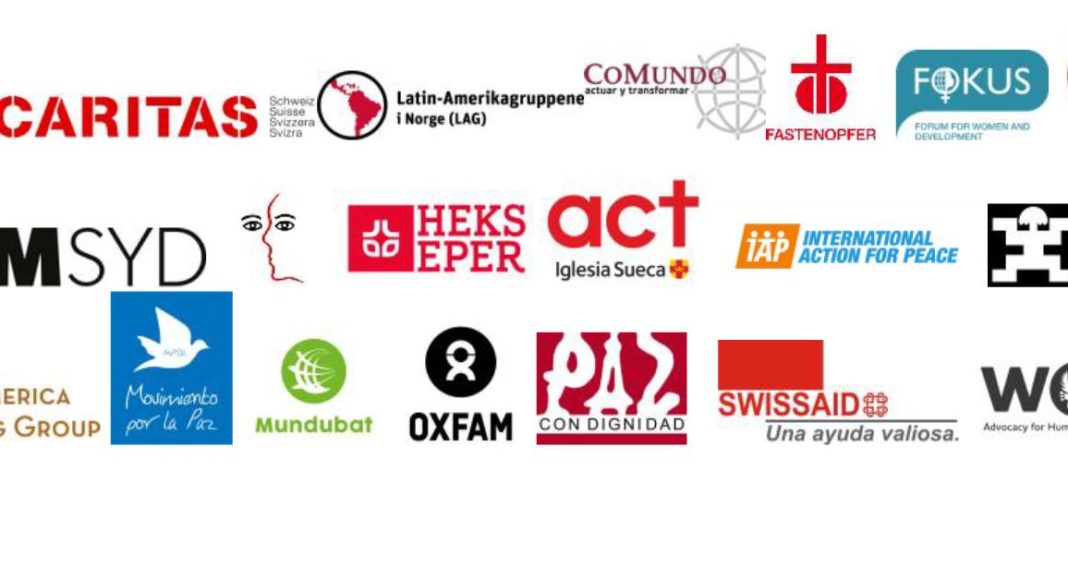COMMUNIQUÉ: COLOMBIA’S PEACE PROCESS AT RISK
International civil society organizations make clear their grave concerns for the serious humanitarian and civil rights crisis in Colombia, which threatens the sustainability of the peace process.
Bogota, 30 May 2019. (Translated from the Spanish by LAB)
The undersigned international civil society organizations, in accordance with our mandates, have been engaged for over 40 years in working for respect for human dignity, guarantees of rights, peace-building and a negotiated way out of the armed conflict in Colombia.
We recognize as a very important step the signing of the Accord between the Colombian government and the guerrillas of the FARC-EP in November 2016, and the advanced talks with the Ejercito de Liberación Nacional (ELN) which, sadly, are currently stalled because of a lack of political will by the parties involved.
The shortcomings and the delays in executing the terms of the Final Agreement; the constant attacks on the Integrated System of Truth, Justice, Reparation and non-Repetition (SIVJR), and in particular the decisions of the Special Jurisdiction for Peace (JEP) – these are putting at extreme risk the lives and legal standing of everyone who has been involved in this judicial process, including the members of FARC.
Added to which are the assassinations, threats, intimidation, and stigmatization directed at defenders of human rights and the environment, both men and women, and at people linked to voluntary crop substitution to replace illegal crops. These threaten all possibility of effectively consolidating peace in Colombia.
According to the Centre for Research and Popular Education (CINEP/Peace Programme), under political violence in 2018 they list 648 assassinations, 1,151 instances of death threats, 304 people injured, 48 attacks, 22 forced disappearances, 3 sexual attacks and 243 arbitrary arrests. In 2019 so far, at least 62 social leaders have been assassinated[1].
The annual report of the ‘We are Defenders’ programme, published in April this year, reports that during 2018 16 human rights defender women were murdered, a level of violence considerably worse than that experienced by men[2].
Information published in the New York times[3] about the existence of an internal directorate within the Army may revive the questionable practice of ‘false positives’ by the Colombian Armed Forces, as happened recently in the case of Dimar Torres, a demobilized member of FARC-EP, assassinated by a soldier on active duty on 22 April 2019 in north-eastern Colombia, as was publicly admitted by General Diego Luis Villegas[4].
We are worried by the response of the Duque government to these very serious accusations, notably the initial reaction of the minister of Defence, who denied the existence of this special directorate, and the serious accusations made by a member of congress from the governing party, which led to the author of the article and a photographer from the New York Times having to leave the country[5].
The Colombian state has an obligation to guarantee Human Rights, to fulfil what was agreed in the Final Agreement signed with the FARC-EP and to take effective measures to protect the life and dignity of persons whose work for peace and human rights is placing them in serious danger.
We therefore request that the government:
- Order its officials to refrain from making statements which stigmatize those who defend peace and human rights, and those who are making the transition to civilian life.
- Order the relevant authorities to speed up their investigations and punish the instigators and perpetrators of assassinations, murders and threats against human rights defenders and members of the FARC-EP who are making the transition to civilian life.
- To recognize the law which established the Special Jurisdiction for Peace (JEP) and to implement its rulings. In particular to investigate the re-arrest of Seuxis Pucias Hernández, determine the legality of this action, determine the truth about his state of health, and guarantee his right to due process.
- Abstain from promoting to high rank in the Armed Forces those who have applied to be dealt with by the Special Jurisdiction for Peace (JEP), or who are the subject of ongoing judicial cases – as a means of guaranteeing to the victims of the conflict that there will be no repetition.
- We call on the President of the Republic, as commander in chief of the Armed Forces, to ensure that all the orders, training manuals and operational documents of the forces follow international and national norms in regard to Human Rights and International Human Rights law.
- To extend the mandate of the UN Verification Mission and of the Office of the High Commissioner for Human Rights, in recognition of the work of the international community in relation to human rights.
- Guarantee the right to information, protecting the exercise of free and independent journalism.
- We call on diplomats accredited in Colombia, the international community and the countries who have directly accompanied the peace process to urge the Colombian government to implement the Final Agreement and take measures to ensure that the stage of implementing peace does not become bloodier than the conflict they all worked so hard to bring to an end.
As International Civil Society organizations, we reiterate our commitment to complete the building of Peace in Colombia and we pledge continue working alongside the victims, rural communities and those who are making the transition to civilian life.
[1] https://www.cinep.org.co/Home2/component/k2/690-informe-ddhh-violencia-camuflada-la-base-social-en-riesgo.html
[2] https://somosdefensores.org/2019/04/23/la-naranja-mecanica/
[3] https://www.nytimes.com/es/2019/05/18/colombia-ejercito-falsos-positivos/
[4] https://www.elespectador.com/noticias/judicial/homicidio-de-dimar-torres-fue-una-ejecucion-extrajudicial-comision-de-paz-articulo-852708
[5] https://www.semana.com/nacion/articulo/periodista-del-new-york-times-abandona-el-pais-por-acusaciones-del-maria-fernan-cabal/616115

